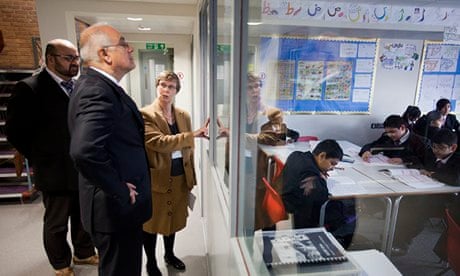"What does Ofsted want?" This question is perhaps the most powerful question in English education. No other question has the singular power to change and often distort learning in schools.
The heads of Ofsted are easily characterised as Dickensian villains: Michael Wilshaw the bullish and hard-hearted Bill Sikes figure and the inspectors as an army of unscrupulous Fagins – manipulating school leaders and teachers alike. No doubt, inconsistencies abound with Ofsted, like any large institution, but perhaps we are own worst enemy? Too often the problem is not the villainy of the inspectors, but instead it is our willing misreading and misapplication of 'what Ofsted wants'.
Regularly I read about school leadership teams who perpetuate myths such as "each child must exhibit progress every 20 minutes", or those who implement a marking and assessment regime which is nigh on impossible to execute without quickly grinding teachers into the dust of exhaustion. It appears that we can be our own worst enemy.
Maybe we are suffering from Stockholm syndrome? This syndrome is characterised by a psychological phenomenon whereat hostages experience feelings of sympathy for their captors, even to the point of defending them. This experience reflects how people respond to trauma. Such is the potential damage of a poor Ofsted inspection to a school, that the anticipation, or experience itself, can become wholly traumatic.
I am not denying that the current accountability regime isn't unnecessarily punitive. When you couple the impact of league tables and a bad Ofsted inspection the results can be catastrophic for a school and any school leader. The sense of trauma is real and it inhibits the real progress of our education system. It is enough to drive people into fearful disarray. Not only that, it serves as a gross distraction from what should be our core focus: improving teacher quality and improving the quality of student learning. With the time invested in sheer protective measures to escape such a perilous fate, students indeed suffer.
And yet, too many schools are implementing wrong-headed policies to please Ofsted (or their supposed diktats) and not to serve our students.
A conversation with a colleague recently revealed his previous school had fell headlong for the 'progress should be exhibited every 20 minutes' myth. Each lesson had to include points in the lesson to reflect on progress, not based on timeliness or need, but created to exemplify 20 minute Ofsted-friendly nuggets. Such expectations are at the expense of responding with agility and wisdom to the actual needs of students and their learning. Not only that, each lesson in his school required a record of progress. A fleet of worksheets were drafted into practical subjects and beyond to 'evidence' progress every lesson.
Every lesson: progress, progress and more progress. More marking for evidence of progress, more teaching for evidence of progress. Less teaching for students and their authentic needs. Less flexibility to adapt and execute agile responses to individual lessons where progress in learning isn't running in smooth, bite-size units.
If those schools are forever reacting knee-jerk to the latest Ofsted scare-stories then they won't ever undertake the sustained deep changes required to really improve. The same is true of learning in the classroom. If every lesson has to mechanically return to the lesson plan, or the requirement for some monkey-dance exhibiting progress every 20 minutes, then we will never get authentic, deep learning.
Where then is the answer to the whole issue? It is not in the question 'what do Ofsted want?' I am not suggesting school leaders be naive about accountability, but I am suggesting that any course of action about improving teaching should be rooted in what the students need and not what some inspector may want in one short snap-shot of teaching. Rather than fearfully responding to whispers and misunderstanding the vagaries of our inspectorate, we should find the bright spots of teaching already shining in our schools and expand upon those.
Sir Michael Wilshaw can help too. He can stop the cheap practice of having inspectors peddling sessions that perpetuate 'what Ofsted [supposedly] wants' in the classroom. He can travel to every city in England and bang the drum about school autonomy. He has stated categorically: "It is not for Ofsted to say 'that is the right way of teaching and that is the wrong way of teaching'… it is up to the head to say."
If there are schools with endless lesson plans that prescribe 20 minute progress points, Wilshaw's can reiterate his following statement about outstanding teachers from his old school: "But they also understood that planning shouldn't be too detailed. It was a framework to give them the necessary flexibility to adapt to a different way of teaching at key moments in the lesson when the mood of the class, as it inevitably does, changes."
We can exercise good judgement and implement what we know is best for the teaching and learning for our students in the context of our own school.

Comments (…)
Sign in or create your Guardian account to join the discussion